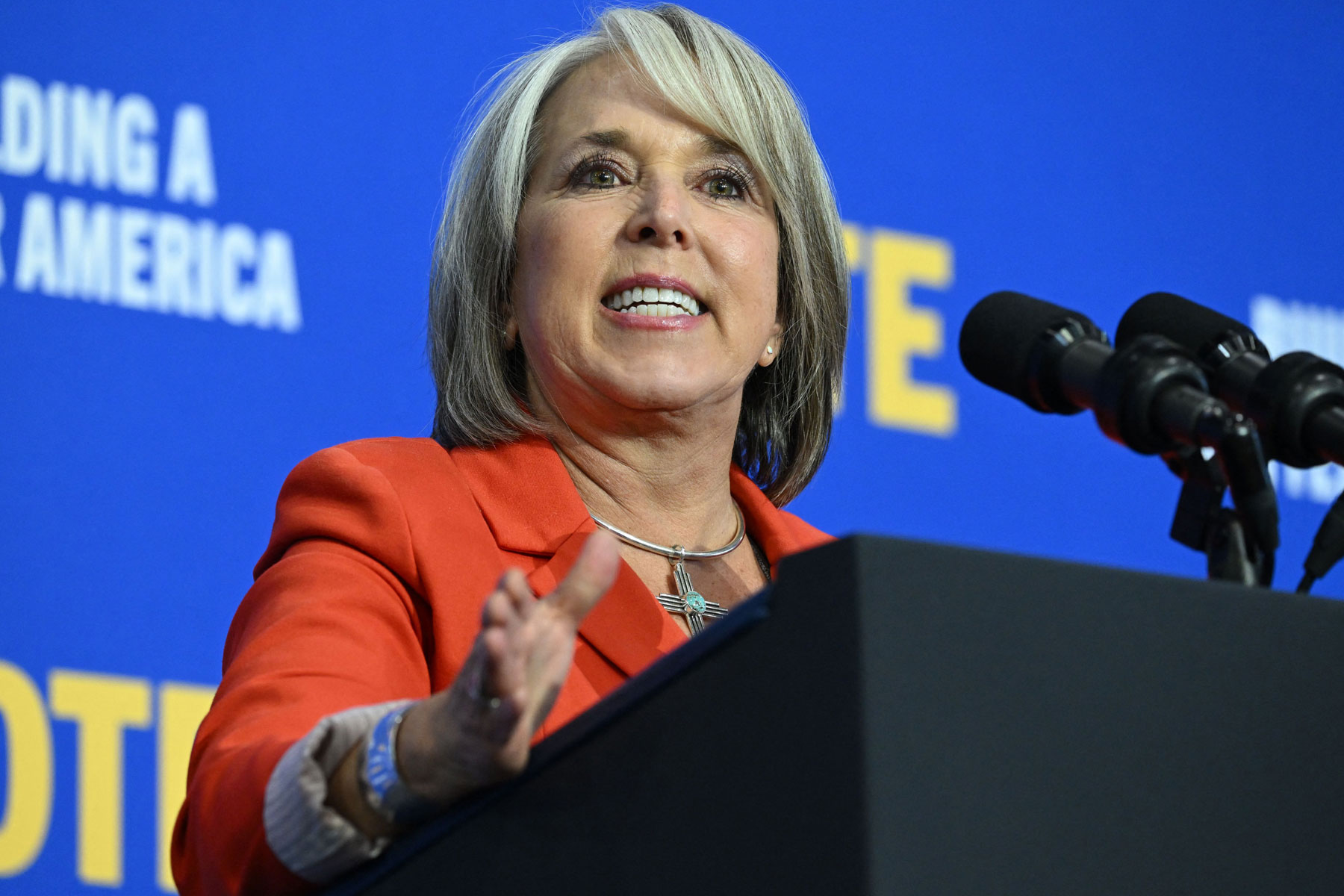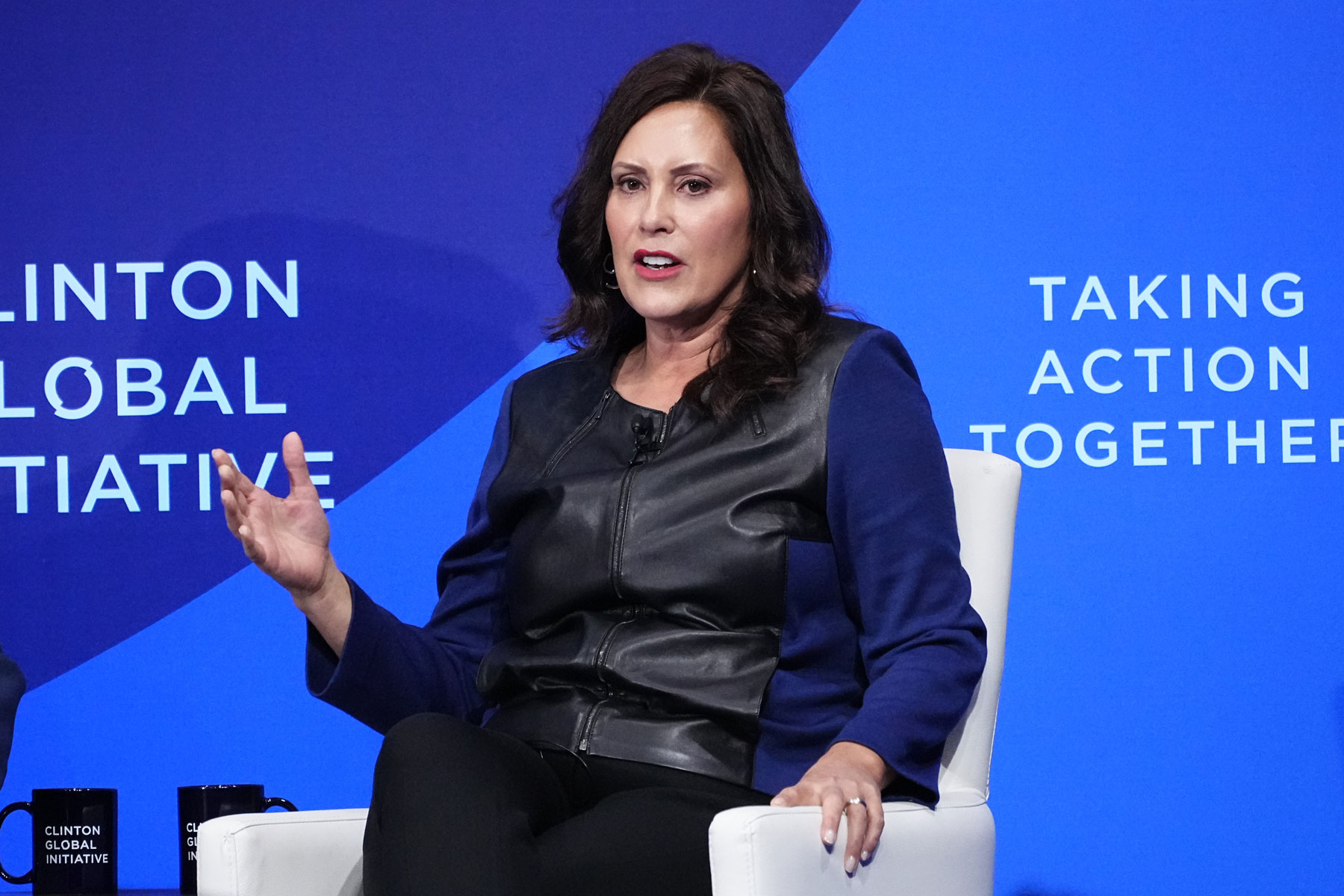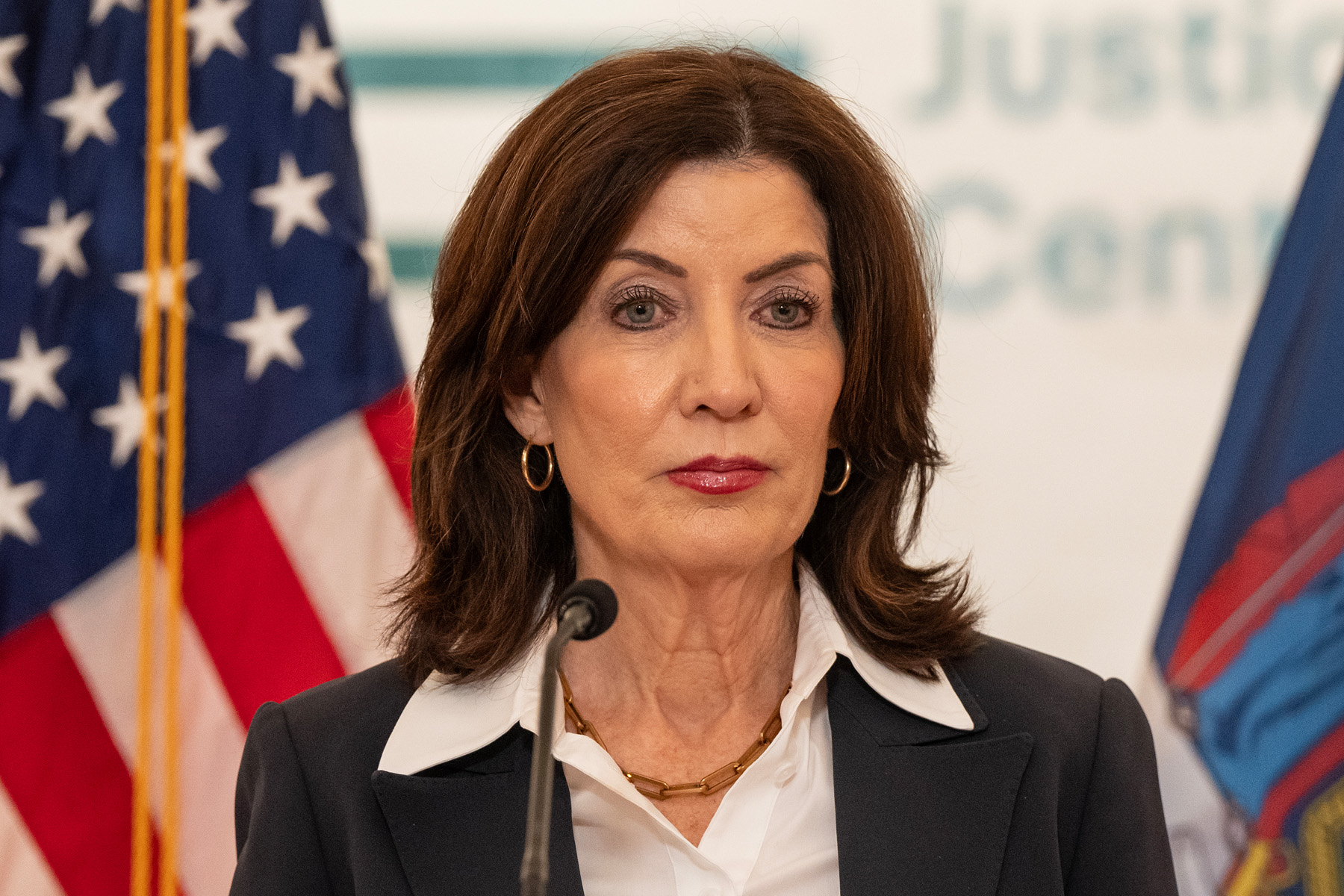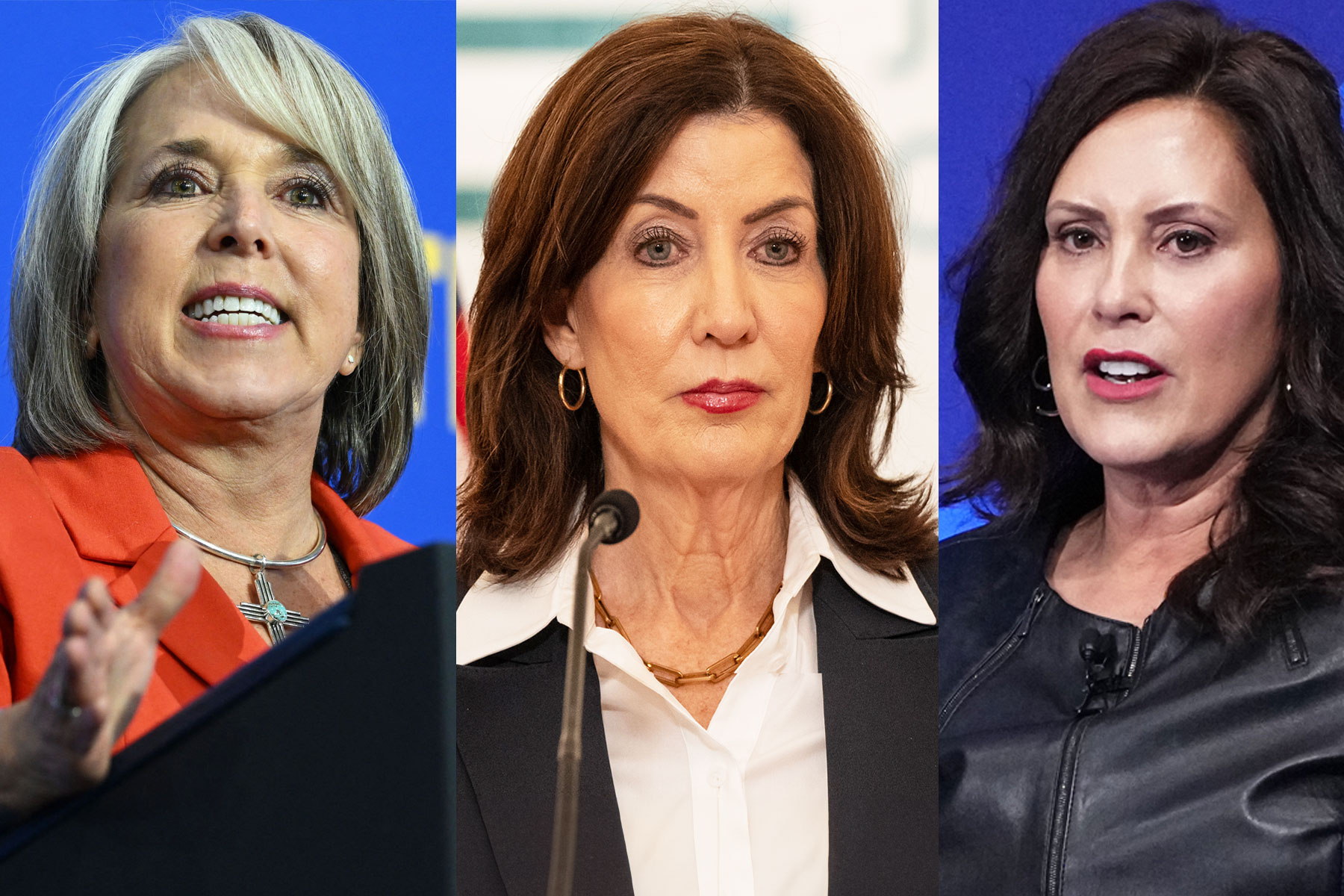Michigan State University. Oxford High School in Michigan. Topps Supermarket in Buffalo, New York. Just-In-Time bowling alley and Schemengees Bar & Grille Restaurant in Lewiston, Maine. Isotopes Park in Albuquerque, New Mexico.
These are the sites of some of the most notorious mass shootings in America in the past two years. And in their aftermath, state lawmakers took action.
Extreme risk protection order laws. Safe storage child protection mandates. Waiting periods for the purchase of firearms.
What also makes these states notable in their actions to curtail the American gun violence epidemic is that they are all led by women governors who have made gun safety a key legislative initiative.
“My hometown was the site of a mass shooting by a white supremacist who was radicalized online during the pandemic,” said Gov. Kathy Hochul of New York, who grew up near Buffalo and previously represented the area in Congress. “As soon as he was old enough, he went and bought a legal weapon here — and then he went across the border to Pennsylvania and bought enhancements that converted it into a military-style assault weapon. So then on a beautiful, calm, sunny day — May 14, 2022, I’ll never forget it — he went into a grocery store and slaughtered 10 people not 10 minutes away from my home where I live.”
Hochul said it was in the immediate aftermath of the Topps Supermarket shooting that she learned more about red flag laws and the effectiveness of extreme risk protection orders. “I said, ‘Well, why aren’t we doing more of this now?’”
She chose to strengthen a red flag tool. Hochul issued an immediate executive order requiring state police to file an application for an extreme risk protection order under the state’s red flag law when they believe an individual is a threat to themselves or others.
“This is a powerful tool that is underutilized,” she said. “So we changed that.”
New York also passed a law that same year prohibiting the purchase of assault rifles by those under the age of 21, and strengthened the state’s concealed carry permitting process and designated sensitive locations in which guns cannot be carried. Last year, New York enacted laws to expand access to economic support for victims and survivors of gun violence and their families, and this year Hochul agreed to at least $347 million in the state budget for the next fiscal year to implement community violence intervention programs.
“This was deeply personal to me,” she said.
-
Read Next:
Angela Ferrell-Zabala, the executive director of the national grassroots gun safety organization Moms Demand Action, describes the gun violence prevention movement as a longstanding “third rail of politics” — but a movement that has changed over the past decade because of the work of a grassroots effort largely led by mothers who weren’t afraid of talking to their peers about gun violence — and desire to see politicians in office who were implementing policies to reverse this.
This movement has converged with a group of governors who are mothers themselves — with significant results, as voters have encountered lawmakers who understand “the fear that folks are experiencing because of gun violence, knowing they can’t just walk to the neighborhood store or drop your kid off at school without considering the violence in this country,” Ferrell-Zabala said.
For New Mexico’s Gov. Michelle Lujan Grisham, the work feels just as personal.
“New Mexico ranks as one of the worst states in the nation for gun violence and one of the worst states in the nation for gun violence that results in the deaths of children,” Lujan Grisham said. The shooting that galvanized her the most, she said, was when an 11-year-old boy was killed and his cousin was severely wounded leaving a minor league baseball game in September 2023.
“Yeah, after that happened — I was done,” she said.

In New Mexico last year, lawmakers passed a child protection safe storage law and enacted a prohibition on straw purchases — a common term for when someone buys a gun for someone who would not be legally able to do so themselves — made without background checks. This year, the legislature passed a bill requiring a 7-day waiting period on all firearms purchases — a measure that sought to give law enforcement more time to complete background checks on gun purchasers.
After the shooting at the baseball stadium parking lot, Lujan Grisham issued an executive order banning open and concealed carry in the Albuquerque area. It was ultimately limited to some parks and playgrounds around Albuquerque, and is under review by the state’s Supreme Court. Lujan Grisham also introduced over a dozen new gun safety measures, including a first-in-the-nation assault weapons ban, during the state’s 30-day budget session this year.
She knows it is work that doesn’t necessarily come without detractors — and sexism.
“I think someone opposing me might say, ‘Oh she had an emotional break’ but no — it’s a practical response to recognizing that my job is actually to make sure that I do everything in my power to make Americans and New Mexicans and their families and their children safe,” Lujan Grisham said. “There are just so many guns out there. That family didn’t see a car with guns. You just can’t see them. You don’t know where they are. You can’t attenuate your risk.”
In Michigan, Gov. Gretchen Whitmer has dedicated many of her efforts to schools — especially given that the two recent mass shootings in her state happened in educational environments.
“Like every parent in America, I think about the fact that my kids have grown up having to learn mass shooting drills as opposed to the traditional kind of weather drills that we always do in schools,” Whitmer said. “It’s such a sad commentary on leadership in this country if you are American, guns are the number one killer of our children. It’s not acceptable and we can do something about it.”
Following the shooting at Michigan State last year, Whitmer signed into law an extreme risk law, a secure storage requirement for firearms to protect children, a background check requirement for all unlicensed gun sales, a law prohibiting those convicted of domestic violence misdemeanors from purchasing or possessing firearms, and an extreme risk protection order law allowing police officers, health care professionals and family members concerned about someone who may harm themselves or others to seek a court order to temporarily confiscate their firearms.

Under Whitmer’s direction, the legislative session still underway includes review of measures prohibiting firearms near polling places and other electoral facilities, distributing public information on secure storage to students’ parents and increased funding for community violence intervention programs.
“I’m proud that here in Michigan, our response to a couple of very notorious shootings was that this new legislature came in and got to work and we got background checks and secure storage and extreme risk protection order laws over the finish line,” Whitmer said, pointing to the Democratic trifecta that came into power in Michigan in 2023, meaning that her party now controls the state’s senate, house of representatives and the governor’s office.
That said, Whitmer recognizes that this is only the beginning of this work — and a potential blueprint for how to get it done to scale in a way that deeply resonates with voters.
“Is there more to do? Absolutely. Is there ultimately going to be a need for national action? Yes. But I think we’ve made progress in the state where talking about gun safety used to be considered a form of political death, and now we hear from parents, from educators, from responsible gun owners that they support measures like these so we can curtail gun violence in this country that is just out of control.”
-
Read Next:
As Ferrell-Zabala travels across the country working with grassroots organizers to lobby their state lawmakers to pass gun safety legislation, she says she sees the Democratic women governors leading on gun safety “at the center” of this work. It’s not a coincidence, given that these state executives can deeply relate to the voting bloc driving this movement: moms.
“It’s no surprise at all that when you have the leadership of women, particularly governors, you’re going to see that people are really stepping up to govern for the masses, governing for their communities, making sure that folks are safe and really taking their leadership very seriously and having the courage to do what it takes to keep communities safe.”
Ferrell-Zabala said this is particularly evident in the way so many of these Democratic women governors have taken swift action in the wake of tragedy in their states.
She points to Whitmer and Hochul especially, who did so by “really hearing the voices of constituents who were saying, ‘No this can’t happen. Not one more time.’”

But she also called attention to the work of people like Gov. Laura Kelly in Kansas and Gov. Katie Hobbs in Arizona as women governors who have strategically used their veto power, noting in particular Hobbs’ veto of an Arizona bill that would have allowed for the shooting of migrants trespassing on property. She also pointed to Kelly’s 2021 veto of a bill to allow people with permits from other states to carry hidden and loaded handguns in Kansas and would have lowered the age of eligibility for a concealed carry permit to 18, and her 2023 veto of a bill that would have required children enrolled in firearm safety programs in public schools to complete a training run by the gun-rights National Rifle Association. This year, Kelly encouraged Democratic lawmakers to attempt weekly introduction of secure storage legislation after the shooting at the Kansas City Chiefs victory parade.
Likewise, following the deadliest shooting in Maine’s history in October 2023, Gov. Janet Mills introduced a legislative package that implemented a background check requirement on all unlicensed gun sales and a 72-hour waiting period for all firearm purchases — the latter a critical measure in a state where 90 percent of gun violence deaths are from firearm suicide.
The Democratic women governors are “looking at things from a 30,000-foot view,” Ferrell-Zabala said, precisely because they bring the experience of being mothers themselves to their work, and a perspective forged in lived experience of thinking not only about their own kids, but all kids in their school, neighborhood and community. “We need to continue to support people, particularly women, that are going to step up and do that heavy lifting that’s often unglamorous.”
Looking at the significant amount of work done by these governors, Ferrell-Zabala said she’s also looking ahead at the work that remains to be done — and the way these women are modeling what the future can and should look like too.
“Michigan and New York are both two good examples of understanding that implementation really is the next step — making sure you go from good law to making sure that folks are educated to understand what’s acceptable, what they can be doing, whether it is just everyday citizens or law enforcement to whoever is engaging with a new law,” she said. Part of that work also includes making sure that all strategies center those most impacted by gun violence in their communities, which is often Black, Brown and young people, and bringing them into conversations about what implementation means on the ground to best help them.
And Ferrell-Zabala said it’s important to remember that the people from these communities who are feeling the impact of these governors’ work the most also vote.
“We’re going to be on the campaign trail, knocking on doors, talking to neighbors at PTA meetings. We will show up wherever moms are and we are going to be talking about what’s at stake — but not just that. That we already have examples of solutions to this crisis.”








